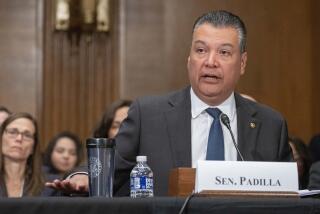Phone Firms Setting Limits on Dial-a-Porn
- Share via
Preferring, no doubt, to discuss the new age in telecommunications, phone companies today are continually called on to discuss one of their oldest offerings--dirty calls. Technology is here, too: Since 1983, dirt comes in recorded messages from “dial-it” services which usually have a 976 prefix and charges of up to $2 a call.
“Ever since we’ve had 976 service, we’ve had controversy,” says Dick MacKnight, spokesman for Denver-based US West, regional holding company for three local Bell companies. “Some is over the adult entertainment, some over the large bills.”
Many phone companies have tried to get rid of the lines, often unsuccessfully, given the inherent First Amendment questions (Are the messages obscene? Can a line be shut down because a past message was obscene? Whose fault is it that children call without permission?) and a common carrier’s responsibility to offer access to all. Others are seeking a way to live with the offensive services without offending customers--either providing a way for consumers to cut themselves off from the service or to cut the phone company’s involvement.
Selective Blocking Option
From the beginning, the primary concern--as perhaps with all pornography--was children. A federal statute immediately made it a crime to transmit obscene or indecent messages over interstate lines to children. “Congress wanted to protect kids,” says attorney Mark Nadel at the Congressional Office of Technology Assessment, “but there’s no simple or 100% effective way of doing it.” Certainly the Federal Communications Commission’s subsequent rule that interstate dial-it calls require credit cards or access codes has been ineffective.
Most such calls are intrastate, even local, and the current solution is local “blocking”: If the consumer chooses, the phone company can make it impossible to dial a particular prefix from a particular phone. But everything on the prefix is lost--sex messages, surf reports, horoscopes, stock quotes. “You can’t block dial-a-porn,” says Pacific Bell spokesman Lissa Zanville, “and keep dial-a-prayer.”
There has also been a charge for blocking, usually nominal, such as the one-time $2 fee Pacific Bell has been charging. This was to go toward the utility’s costs--still unestimated, or, in Pacific Bell’s case, variously estimated at “several times” the fee or “between $15 and $20.” The 976 vendors were to pay the balance later, when Pacific Bell saw what blocking-- which involves punching something into a central computer--actually cost. Consumers were charged up front, Pacific Bell explains, so they wouldn’t just automatically order blocking because it was free. (Pacific Bell announced Thursday that it will no longer charge.)
Separate Prefixes Proposed
Some companies may soon offer selective blocking, so customers can avoid the offensive without losing the vital--the surf reports perhaps, horoscopes, stock quotes. US West’s subsidiaries, for example, will have a new, and blockable, 960 prefix just for adult messages. (Ironically, this will give some areas dial-a-porn for the first time: Northwestern Bell, for one, refused to carry it before in its area--Iowa, Minnesota, Nebraska, the Dakotas.)
Pacific Bell will offer--along with 976 prefixes--local “900” area codes with separate prefixes for general messages, for “live” (group) conversations, and for adult services, recorded and live. These 900 numbers will be separately blockable, and some may be expensive, not being limited, such as 976 service, to $2 per call. Message vendors can be on one service or both, i.e., they could have everything--easy to dial 976 numbers plus higher 900 fees--while consumers would still be unable to block out porn and porn alone.
The question then will be prefix assignment. US West companies will themselves decide who gets 960 and “what we’ll allow on 976,” says MacKnight. Pacific Bell will let vendors “self-nominate” for a particular 900 number, subject to the review of a community board set up by Pacific Bell.
A bill now before California’s Legislature would force sexually explicit messages onto a separate prefix, with a threat of court action and fines if they don’t “choose” the appropriate prefix. But if anyone has to judge and categorize a message, “better a court,” says Paul Fadelli, consultant to the state Senate Energy and Public Utilities Committee, “than the telephone company, Public Utilities Commission or Legislature.”
Alternatively, or in addition, phone companies want to distance themselves by “discontinuing billing for vendors we consider harmful to our reputation,” says US West’s MacKnight. US West subsidiaries will have to give those vendors records of calls made, but “you don’t have to associate yourselves with them in your billing envelope,” says Northwestern Bell spokesman Jim Atkinson in Omaha.
“If we discontinue billing,” says MacKnight, “but don’t deny access, it doesn’t become a First Amendment issue.” It does, however, raise other issues: “What is a utility’s function?” asks Charlie Ryan, a 976 service operator and president of California’s Information Providers Assn. in San Diego. “Transport, obviously, but is billing? Or is that a private business? Don’t information providers have the right to have a telephone company bill for their services in accordance with public utility law, which is non-discriminatory?”
Under another bill proposed in California, Pacific Bell would not have to offer billing or billing information: excluded vendors, says Pacific Bell’s Zanville, “will have to do it by credit card or subscription.” Pre-subscription is the vendors’ greatest fear because of the marketing and administration required--a “real setback,” Ryan says, for vendors. An even greater fear is that kids might call less if they can’t just pick up a phone and dial.
If dial-a-porn sullied the image of many phone companies, it also put them into the position of a “white knight.” “The telephone company is stepping into a new era of social consciousness,” says consultant Fadelli.
But threatened with separate prefixes and separate billing--both limiting their access to the public and the public’s access to them--Ryan’s colleagues see it differently: “The telephone company,” says Ryan, “should not be the decider of what people should or shouldn’t have.”
More to Read
Sign up for Essential California
The most important California stories and recommendations in your inbox every morning.
You may occasionally receive promotional content from the Los Angeles Times.













